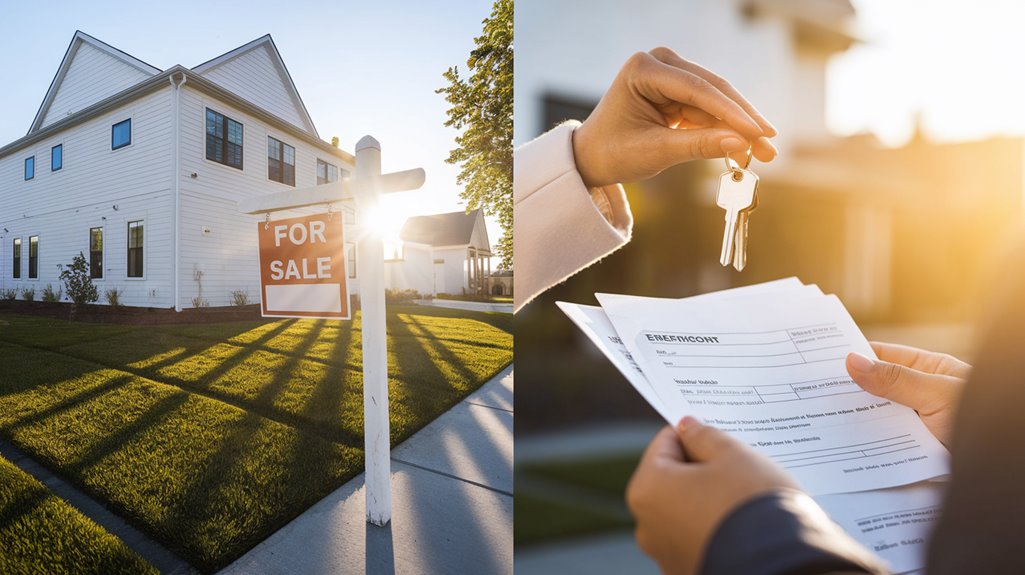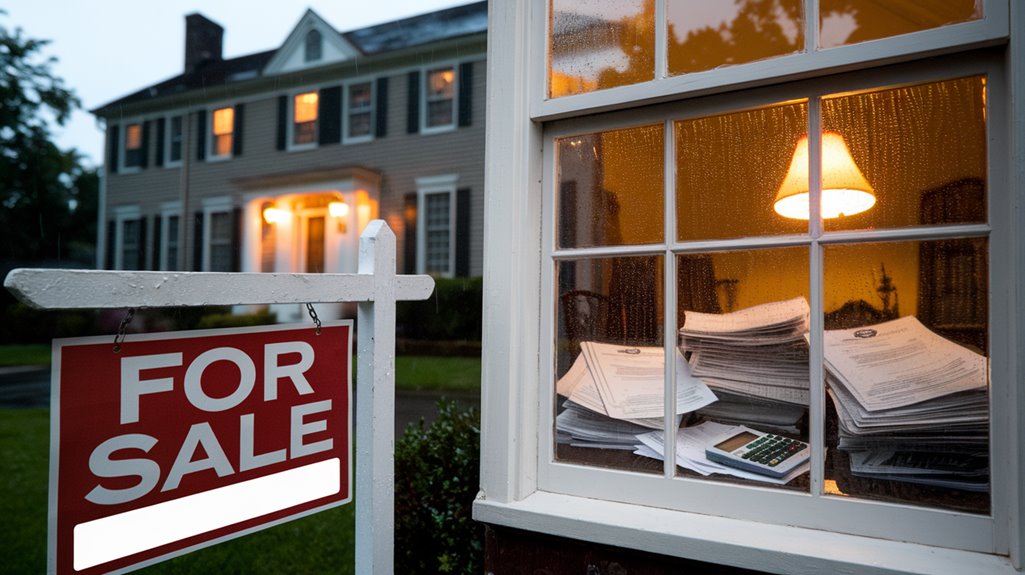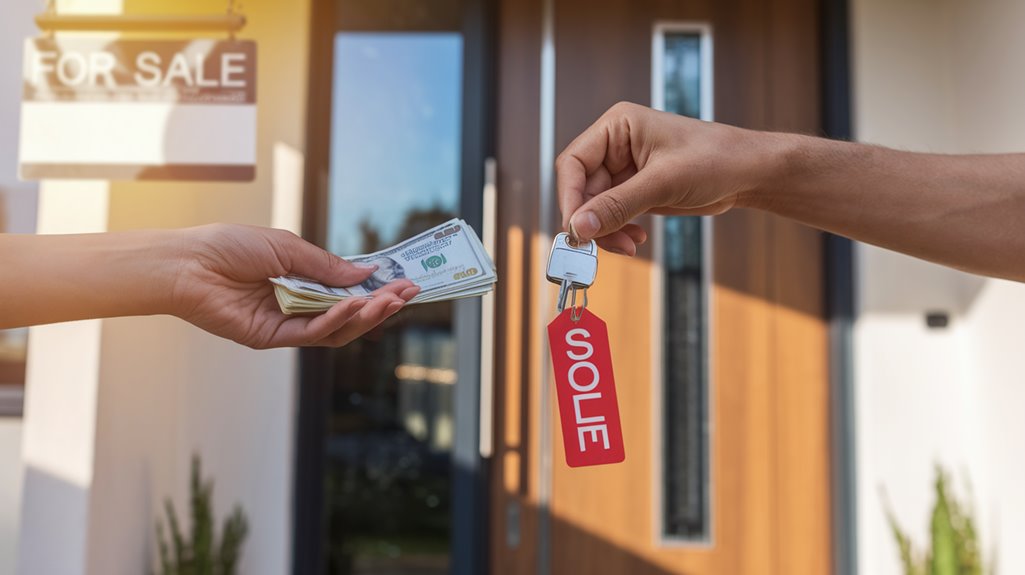
Owning a home with an ongoing mortgage can create uncertainty when you decide to sell. Many homeowners worry about the implications of selling their property while still making monthly payments.
You might question whether it’s even possible or legal to sell your house with an existing mortgage. The stress of managing mortgage payments while trying to sell your home can be overwhelming.
If you’re planning to move or upgrade, your current mortgage might feel like a burden. This situation may leave you wondering about the right steps to take.
The process involves using the sale proceeds to pay off your remaining mortgage balance. This blog will guide you through each step of selling your mortgaged home successfully.

You build equity in your home through regular mortgage payments and value appreciation. This equity represents your true ownership stake in the property. If your house is worth $300,000 and you owe $200,000, then your equity equals $100,000. Lenders evaluate your capacity to repay through income verification, employment history, and monthly debt obligations. Your equity can increase through home improvements and property upgrades.
When it’s time to sell, your equity position will determine your potential profit. You can sell your house while still having an active mortgage loan. While the sale happens, the proceeds will first pay off your remaining loan balance. If your home’s value has increased, you might receive additional money after the sale.
If you maintain regular payments, your equity will grow steadily over time. Since property values often rise, your equity might increase faster than expected. You should track your equity position to understand your financial standing in the property.

Selling a house with a mortgage is a common practice in today’s real estate market. Most people choose to sell before paying off their home loans completely.
You must consider several key factors before selling a mortgaged property:
Your equity position plays a crucial role in the sale process. If you have positive equity, it will help cover all expenses. When your equity is negative, you might struggle to complete the sale. In such cases, you could explore options like short sales. Kitchen upgrades can provide significant returns on investment before selling.
So, it becomes vital to check your equity status early. This step will guide your decisions about sale timing. You can then set the right price for your property. The closing agent handles payoff during the final transaction process. If the market conditions are favorable, you will find it easier to sell. Since most buyers understand mortgaged properties, they remain open to such purchases.

You can sell a house with a mortgage through proper planning and procedures. This process starts with getting a payoff statement from your mortgage lender. You must know the exact amount you need to pay off your loan. A real estate agent will help you set the right price for your home.
While selling, the home’s value should be higher than your remaining mortgage balance. If your home sells, the money will first pay off your existing mortgage. The remaining funds will cover fees like agent commissions and closing costs.
You might face challenges if your home’s value is less than your mortgage balance. In such cases, you should talk to your lender about a short sale option. Deep cleaning and making small home improvements can help attract better offers. Most homeowners spend ten years in their homes before selling.
When the sale closes, the title company handles all financial transactions. So, if there’s money left after paying all obligations, you will receive it.
The process can be smooth if you work with experienced professionals. Hence, you should choose a knowledgeable real estate agent and title company. If you understand these steps clearly, you can navigate the sale process successfully. Since many homeowners sell with mortgages, lenders are familiar with this process.

Your mortgage ends when you sell your home through a complete payoff process. The sale money will pay off your remaining loan balance first. You must also pay closing costs, fees, and real estate agent commissions. If your home sells for more than you owe, you’ll keep the extra money.
The payoff process includes several money-related steps:
Most homeowners sell within 10 years of purchasing their property, well before their 30-year mortgage term ends. A title search will need to be completed to ensure there are no additional liens on the property. If you owe more than your home’s value, you’ll need to discuss a short sale with your lender. Some loans allow buyers to take over your existing mortgage terms. This option works well when current interest rates are higher than your loan rate. If the loan amount is less than the sale price, buyers will need extra money.

A mortgage payoff process guides homeowners through clearing their loan during a home sale. You must contact your lender to request a payoff statement for your mortgage. This statement shows the exact amount needed to close your loan. Extra liens and fees must be settled before finalizing the sale.
Your lender will provide details about the remaining balance and extra costs. We include three main parts in a payoff statement: principal balance, interest charges, and fees. If you plan ahead, you can avoid delays since lenders often need several weeks. Prepayment penalties may apply when paying off your mortgage early.
It is important to check if your home’s sale price will cover all expenses. You should review the settlement statement to confirm the available funds. The final payoff total changes each month because of new interest charges. When you work with your lender, you can get updated figures near closing. This partnership ensures all numbers match up correctly. If everything aligns properly, your mortgage will clear smoothly during the sale.

The process of selling your mortgaged house begins with obtaining an official payoff statement to determine your remaining loan balance. You’ll need to assess your home’s current market value through a professional appraisal or comparative market analysis to ensure it exceeds your mortgage debt. After accounting for closing costs, including agent commissions and title fees, you can proceed with the sale, using the proceeds to satisfy your mortgage payoff and related expenses. Over fifty percent of sellers have active mortgages when they sell their homes, making this a common scenario in real estate transactions.
Your remaining mortgage balance shows how much you still owe on your home loan. You must check with your lender to get the exact amount before selling your home. This information will help you set the right selling price.
These factors affect your final mortgage balance:
If you make extra payments, your balance will decrease faster than scheduled. You can find your current balance on your monthly mortgage statement. Your lender keeps the most up-to-date records of your loan status. The calculation considers the compounded interest impact over time. Amortization schedules can help track how your payments split between principal and interest.
When you decide to sell, request a payoff statement from your lender. This document lists the exact amount needed to clear your mortgage. The final amount includes any processing fees or penalties.
You should understand your remaining balance to know your home equity position. If home prices have risen, you might make a good profit from the sale. While online tools can estimate your balance, your lender provides the most accurate figure.
Market value shows what your home is worth based on current real estate conditions. You need to look at three similar homes that sold recently in your area. The comparison should include factors like location, size, and special features. Licensed appraisers typically provide the most reliable formal estimates of property value.
We recommend using different methods to find the right price for your home. You can check the sales of nearby homes to understand market trends. The cost approach will tell you how much it would cost to build a similar house.
If you want to rent your home, you should consider the income method too. Economic conditions like interest rates significantly influence your property’s market value. You can find sale prices through tools like FHFA calculator and MLS listings. Real estate agents will help you understand the data and find good comparisons.
Your home’s value affects how much equity you have compared to your mortgage balance. If you set prices based on personal needs, you might miss the true market value. So, you should focus on what the market data reveals about your property’s worth.
When finding comparisons, you must look at homes sold in the last three months. A professional real estate agent can give you accurate market insights. Your final price should match what buyers are willing to pay in your area.
Closing costs are additional expenses you must pay when selling your mortgaged home. You will need to set aside about 1.81% of your home’s price for standard closing costs. This percentage does not include real estate agent fees. Standard costs vary significantly by state, with closing cost percentages ranging from 0.8% to 3.9%.
When you sell, you must cover several specific expenses:
If you want to know your profit, subtract the mortgage balance and closing costs from the sale price. You should contact your lender for an exact mortgage payoff amount. A local real estate agent can help estimate these costs in your area.
So, your final proceeds depend on these key factors:
While each sale is unique, understanding these costs helps you plan better. This knowledge will prevent surprises during the closing process.
The mortgage payoff process concludes your home sale with final mortgage settlement. You must obtain a payoff statement from your lender. This statement shows the exact amount needed to clear your mortgage balance.
If you stop payments before closing, you might face late fees and penalties. So, you should continue making regular mortgage payments until closing day. Your escrow account balance will typically be refunded within 30 days after closing. A careful review of your mortgage documents is essential at this stage.
The closing starts after both parties sign the purchase agreement. While your buyer handles inspections, you will work with title professionals. They help coordinate your mortgage payoff details. Your lender will set an expiration date for the payoff amount. This amount usually stays valid for a few days after closing.
The buyer’s funds will cover your existing mortgage and closing costs. You will receive a settlement statement with all costs and proceeds listed. After paying the mortgage and fees, you get the remaining money. If all steps go smoothly, the property transfers to the new owner. Then, you will have no further obligations to your mortgage lender.

When you’re selling a house with a mortgage, you’ll need to assess whether your home’s value covers the outstanding loan balance to avoid negative equity complications. You’ll also want to check your mortgage agreement for prepayment penalties, which could reduce your net proceeds from the sale. If your home’s value falls below your mortgage balance, you might need to pursue a short sale, requiring your lender’s approval and potentially affecting your credit score. To maintain financial stability, some homeowners explore loan modification options with their lender before committing to a sale.
Negative equity occurs when your mortgage balance is higher than your home’s current market value. You must get your lender’s approval before selling a home with negative equity. This situation makes selling complex because it breaks your original mortgage terms.
When selling with negative equity, you can choose these options:
If you have negative equity, your borrowing options will be limited. Your loan-to-value ratio affects refinancing possibilities. You need to watch local property prices to understand market trends. While prices stay low, your options remain restricted.
So you must seek expert advice to handle this situation well. A professional can assess market conditions for you. They will help create a plan to reduce financial losses. You can then make better decisions about selling your home.
If market conditions improve, your negative equity situation might change. You should explore every available option before making final choices. Since timing matters, you must act based on current market trends.
Mortgage prepayment penalties are fees charged when borrowers pay off their loans ahead of schedule. You must pay these penalties whether you’re selling your home or refinancing. This rule applies to both soft and hard prepayment types.
Your lender calculates these fees through different methods. It may charge a percentage of your remaining balance. Some lenders base the fee on several months of interest payments. If you have a $250,000 home loan with 5% interest, your penalty could reach $6,250.
We recommend checking your mortgage documents for penalty details. You should plan your home sale after the penalty period ends. The penalty period usually lasts three years from loan start. If you need to sell sooner, you must ensure sale profits cover both loan balance and penalties.
When timing is crucial, a refinance option might help avoid penalties. You can switch to a new loan without prepayment restrictions. So your future sale won’t trigger any extra fees. If you refinance, your new terms should align with your selling timeline.
Short sales provide homeowners with an alternative to avoid foreclosure when they can’t pay their mortgage. You must gather extensive financial records to prove your financial hardship to the lender. The approval process often takes several months and requires patience. If you prepare all documents correctly, your chances of approval will increase significantly.
These key challenges arise during a short sale:
This process requires careful handling of expectations from both buyers and lenders. You should maintain clear communication with everyone involved in the transaction. The property sells in its current condition without improvements. Since short sales are complex, professional guidance proves valuable.
While working with specialists, they can help manage the approval requirements. A real estate agent with short sale experience will guide you through each step. So you can focus on gathering the required documentation for lender review.
If buyers understand the timeline upfront, they will stay committed to the purchase. When lenders see complete documentation, they process approvals faster. This transaction type needs extra attention because multiple parties must agree on terms.
When selling a property with multiple mortgages, you’ll need to obtain payoff quotes from each lender and ensure the sale price covers all loan balances. If you have an FHA loan, you must comply with specific occupancy requirements and may need to complete a short sale if you’re underwater. VA loans require clearance from the Department of Veterans Affairs and may involve additional documentation to verify the buyer’s eligibility if they’re also using VA financing.
Multiple mortgages on a home require careful planning when you decide to sell. You must add up all loans against your property before starting the sale process. This includes your main mortgage and any second mortgages or equity lines.
If you want to sell, you should first check these key items:
You need enough sale profit to clear all mortgages at closing. We suggest working with a money expert to review your options. This helps when you have little equity or need a short sale. If the sale won’t cover your loans, you might need extra cash at closing.
When you close, both mortgages must be paid in full. You stay responsible for any leftover loan amounts. Your lenders might negotiate if you face financial problems. This can help you avoid bringing extra money to closing.
FHA and VA loans are special mortgage types that need careful handling during a home sale. You must pay the existing FHA mortgage fully when closing the sale. This process works similarly to conventional loans.
Your FHA loan comes with a unique benefit of being assumable. If you have a low interest rate, buyers can take over your loan terms. But the new buyers must meet strict FHA rules first.
When selling to FHA loan buyers, you should know about anti-flipping rules. These rules block FHA sales within 90 days of buying a property. You can get an exception if you inherited the home.
If you want to save money on your FHA sale, close early in the month. This timing will help you avoid extra interest charges. You should talk to your lender about possible refunds on mortgage insurance premiums.
We recommend working with an expert who knows FHA and VA loan rules. If you follow the correct steps, you can have a smooth sale process. This guidance will help both sellers and buyers meet their goals.
You’ll need to carefully evaluate market conditions, including supply and demand dynamics and interest rates, to determine the optimal time to list your home. The selling process typically requires 2-3 months from listing to closing, though market conditions and buyer financing can extend this timeline. Understanding these timing factors becomes especially critical when you’re selling with a mortgage, as you must continue making payments until the sale is complete.
The best time to sell your home depends on market conditions and seasonal patterns. You should plan your sale during peak seasons to maximize returns. Spring and early summer bring the highest number of potential buyers.
May and June create excellent opportunities for sellers in most markets. You can expect your home to sell within 19 days during these months. Serious buyers often compete actively during this period, leading to higher offers.
When choosing your selling time, you must consider several factors:
If you list during spring, you will find more potential buyers. While spring remains popular, other seasons might work better in certain markets. You could benefit from less competition if you sell during off-peak times.
Some buyers need to purchase homes throughout the year. This fact creates opportunities even in slower seasons. If your local market stays active year-round, you might succeed in any season.
While timing matters, your specific situation should guide your decision. You must balance market conditions with your personal needs. So, consider both factors before setting your sale date.
The process of selling a house with a mortgage typically takes between 30-60 days. You must first get a payoff statement from your lender. We recommend checking your home’s market value before listing it for sale.
Several steps happen during the standard selling timeline. Your buyer will need time for mortgage approval and home inspections. The title company must verify clear ownership of the property. If you choose a cash buyer, this process can move much faster.
The local housing market affects how quickly your house will sell. You should prepare for possible delays from inspection issues or repairs. When buyers need mortgage financing, the process usually takes longer than cash deals.
The closing phase involves important legal and financial steps. You will sign documents to transfer ownership rights. The escrow company handles money transfers between all parties. After closing, they will pay off your existing mortgage balance.
Your final proceeds arrive once all transactions are complete. If any repairs were agreed upon, you must finish them according to schedule. While most sales follow this timeline, various factors could speed up or slow down the process.

Cash home buyers provide fast solutions for homeowners who need to sell properties with existing mortgages. You can quickly resolve your mortgage obligations through these buyers’ direct purchase offers.
When you choose cash buyers, several benefits become available:
This process works differently from traditional home sales. If you work with cash buyers, you’ll avoid common financing delays. They will show proof of funds before starting the transaction. So, you can complete the sale within two to three weeks.
We recommend checking multiple cash offers to get the best deal. You should verify each buyer’s business credentials before proceeding. When choosing a cash buyer, consider their reputation and track record.
If you need to sell quickly, cash buyers can help clear your mortgage fast. This option removes the stress of monthly payments sooner. While traditional sales take months, cash sales conclude quickly.
Since cash buyers handle everything directly, you face fewer complications. They will manage all paperwork and closing processes. You only need to review and sign the final documents.
Chris Curry offers three key benefits: quick closings, secure funding, and flexible terms. You can sell your house fast when you choose our direct buying process. We make the home-selling experience easier for homeowners with existing mortgages. Our team handles all aspects of closing without lengthy delays or complications.
If your property has a mortgage, you will benefit from our straightforward purchase system. We don’t require time-consuming appraisals or house inspections for the sale. You will receive immediate cash payment to clear your existing loan balance.
The process with Chris Curry eliminates common hurdles in traditional home sales. We buy properties as-is without asking for repairs or improvements. You won’t need to pay extra lender fees or deal with complex financing terms.
Our no-contingency approach makes the transaction simple and predictable. If you work with us, you can avoid the uncertainty of buyer mortgage approvals. This direct method ensures a quick resolution of your existing mortgage obligations.
While traditional sales often face delays, we complete transactions within days. So you can move forward with confidence and peace of mind. Your mortgage concerns will end through our efficient closing process.
You can definitely sell a house with an existing mortgage. The process requires proper coordination between you, your lender, and the buyer. Your mortgage payoff amount will come from the sale proceeds at closing.
We buy houses in these locations:
We at Chris Curry are professional cash home buyers who can help you sell your mortgaged property. You will receive a fair cash offer within 24 hours of contacting us. Our team handles all paperwork and coordinates with your lender for a smooth closing. If you want to sell your mortgaged home quickly, Contact Chris Curry today.
@ 2024 Chris Curry. All Right Reserved